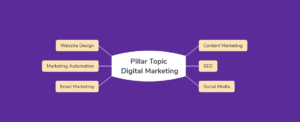Topic clusters are an important SEO strategy for eCommerce websites because they help search engines understand the organisation of a website’s content, which can lead to higher rankings, increased visibility, and ultimately, more conversions. In this post, we’ll explore what topic clusters are, why they’re important for eCommerce SEO, and provide an example of how to create topic clusters on an eCommerce website.
What are Topic Clusters?
Topic clusters are a group of web pages that focus on a central topic or theme. The main topic is known as the pillar page, and it is supported by subtopics, known as cluster content. The pillar page covers a broad topic and provides an overview of the topic. Cluster content, on the other hand, delves deeper into the subtopics and provides more detailed information.
Why are Topic Clusters Important for eCommerce SEO?
There are several reasons why topic clusters are important for eCommerce SEO:
- Improved User Experience: Topic clusters create a better user experience by providing a clear organisation of content. Users can easily navigate through the site and find the information they need.
- Increased Visibility: Topic clusters improve visibility by signalling to search engines that the site is an authority on the topic. By organising content around a central theme and interlinking related pages, topic clusters can help eCommerce sites rank higher on SERPs. Higher rankings mean increased visibility and more organic traffic.
- Higher Click-Through Rates: Topic clusters can lead to higher click-through rates (CTR) by providing users with more relevant information. When users search for a specific keyword, they are more likely to click on a link that leads to a page that addresses their specific needs. By creating cluster content that is tailored to specific user needs, eCommerce sites can increase CTR and drive more traffic to their site.
- More Conversions: Topic clusters can lead to more conversions by providing users with more information about a specific product or service. By creating cluster content that is tailored to specific user needs, eCommerce sites can provide users with the information they need to make informed purchasing decisions. This can lead to more conversions and increased revenue for the eCommerce business.
How to Create Topic Clusters on an eCommerce Website?
Here’s an example of how to create topic clusters on an eCommerce website:
Choose a Broad Topic: Choose a broad topic that is relevant to your eCommerce business. For example, if your eCommerce site sells beauty products, your broad topic could be “skincare.”
Create a Pillar Page: Create a pillar page that covers the broad topic. The pillar page should provide an overview of the topic and link to the cluster content. Using our example, the pillar page could cover different types of skincare routines.
Create Cluster Content: After creating the pillar page, create cluster content that delves deeper into the subtopics. Each cluster content should be optimised for a specific long-tail keyword related to the broad topic. Continuing with the example, the cluster content could include articles about “10 essential skincare products,” “how to choose the right moisturiser,” and “the benefits of using facial masks.”
Interlink the Pages: Interlink the pages within the topic cluster. Linking the cluster content to the pillar page and other related cluster content helps search engines understand the relationships between the pages and signals that the site is an authority on the topic.
FAQs about Topic Clusters:
Q: How many subtopics should be included in a topic cluster?
A: There is no set number of subtopics that should be included in a topic cluster. It depends on the depth and breadth of the topic.
Q: How often should I update my topic clusters?
A: It’s a good idea to update your topic clusters regularly to ensure that the content is up-to-date and relevant. Aim to update your pillar pages every 6-12 months and cluster content every 3-6 months.
Q: Can I create multiple topic clusters on my eCommerce website?
A: Yes, you can create multiple topic clusters on your eCommerce website. It’s a good idea to create topic clusters for each of your product categories or subcategories.
Q: Can topic clusters help with local SEO?
A: Yes, topic clusters can help with local SEO by creating pages that are optimised for local keywords. For example, if you run a local beauty store, you could create a topic cluster around “beauty services in [your city]” with cluster content that covers different types of beauty services offered in your city.
Topic clusters are an effective SEO strategy for eCommerce websites that can improve user experience, increase visibility, and ultimately lead to more conversions. By creating a pillar page and supporting cluster content, eCommerce sites can organise their content around a central theme and signal to search engines that they are an authority on the topic. By interlinking related pages, eCommerce sites can create a better user experience and increase click-through rates. If you haven’t already, consider implementing topic clusters on your eCommerce website to improve your SEO and drive more conversions. Contact Media Matters for more information on how to optimise your topic clusters.






